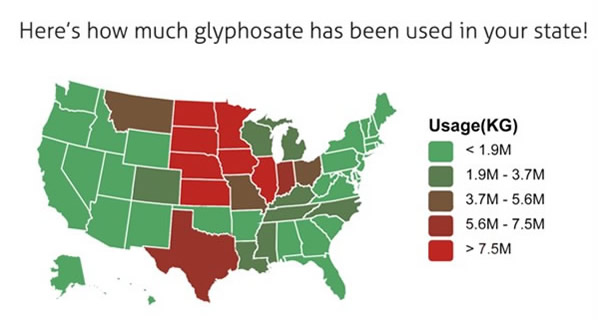Glyphosate is the active ingredient in the systemic herbicide formulation Roundup®, as well as in several generic “glyphosate-based herbicides” (GBHs).
These herbicides are applied around the world to most of the acres where genetically engineered (GE) crops are grown, and glyphosate is now the most heavily used pesticide active ingredient in the world. In fact, no pesticide in history has ever come close to the volume of glyphosate sprayed by farmers worldwide in 2015.
GBHs are also often used right before harvest in conventional agriculture systems to hasten the drying down of crops, so that harvest operations can begin before bad weather sets in. These so-called “green-burndown” uses leave markedly higher residues in harvested grains, beans, and oil crops, and have brought about a sharp increase in glyphosate dietary exposures since around 2000.
Monsanto claims on its website that glyphosate is fully tested and safe for humans, animals, and our pets because:
“It works by disrupting a plant enzyme involved in the production of amino acids that are essential to plant growth. The enzyme, EPSP synthase, is not present in humans or animals, contributing to the low risk to human health from the use of glyphosate according to label directions.”[1]
This statement is only partially true. It fails to acknowledge research evidence that links exposure to GBHs to cancer, chronic liver and kidney disease, and damage to DNA in cells. Some of these effects have been reported in animal studies at doses well below regulatory limits. It also ignores recent evidence that glyphosate’s antibacterial activity may be altering the microbiome in the gut of animals, including humans.
Birth defects from glyphosate
Studies have shown that in some regions where GBHs are heavily used, glyphosate is present in the natural environment, drinking water, and food at levels sufficient to have triggered adverse cellular disruption and developmental abnormalities in people.
Glyphosate causes birth defects in many vertebrates including humans. Dr. Andrés Carrasco, an embryologist and the former director of the molecular embryology laboratory at the University of Buenos Aires, demonstrated in the laboratory how glyphosate causes birth defects in frogs, chickens, and mice.[2]
Glyphosate over-stimulates the retinoic acid (vitamin A) signaling pathway, and this causes errors in gene sequencing during early fetal development.[3]
Glyphosate (probably) causes cancer
In a surprising development with global repercussions, on March 20, 2015 the International Agency for Research on Cancer (IARC) reclassified glyphosate as “probably carcinogenic.”[4]
The World Health Organization set up the IARC to take on a vital task – alerting the world to the known, probable, and possible causes of cancer. The IARC has developed a highly refined, transparent, and data-driven process for evaluating all available data on the possible links between chemicals or lifestyle factors (like sunlight or smoking) and cancer.
The IARC’s mission and mandate is to identify whether science supports a link between a chemical, for example, and the incidence of a specific cancer. It relies on three sorts of data: animal toxicology studies, epidemiology studies on exposed human populations, and mechanistic studies designed to detect cellular or genetic damage that can be a first step toward cancer.
The IARC identifies cancer risk factors, but it does not strive to quantify risk. Quantifying cancer risk is difficult and very data intensive because several additional factors must be taken into account including exposure levels and timing, other exposures and the general health of an exposed population.
Bringing together evidence from human populations, laboratory animals, and studies using human cells exposed to glyphosate, the IARC concluded that glyphosate is a “probable” human carcinogen. Their conclusion is even more worrisome in light of the fact that human exposures to glyphosate are will almost inevitably rise in many parts of the world for years to come.[5]
Additional concerns
Glyphosate can trigger a number of other harmful effects.
- It is an endocrine disruptor[6],[7] and promotes the growth of breast cancer cells.[8]
- It inhibits key enzymes necessary for normal human biochemistry.[9]
- It works as an antibiotic and may disrupt gut bacteria,[10],[11] and therefore possibly the health and functioning of the human GI (gastro-intestinal) tract.
© 2015 GMO Science. All Rights Reserved
References
- http://www.monsanto.com/products/documents/glyphosate-background-materials/back_history.pdf.↑
- Paganelli A, Gnazzo V, Acosta H, López SL, Carrasco AE.Glyphosate-based herbicides produce teratogenic effects on vertebrates by impairing retinoic acid signaling. Chem Res Toxicol. 2010;23(10):1586-95.↑
- Carrasco AE. “Teratogenesis by glyphosate based herbicides and other pesticides: Relationship with the retinoic acid pathway,” in Breckling B, Verhoeven R. 2013. GM-Crop Cultivation – Ecological Effects on a Landscape Scale. Theorie in der Ökologie 17. Frankfurt, Peter Lang. Also available at http://www.gmls.eu/beitraege/113_Carrasco.pdf↑
- http://www.iarc.fr/en/media-centre/iarcnews/pdf/MonographVolume112.pdf.↑
- Landrigan PG, Benbrook C. GMOs, Herbicides, and Public Health. N Engl J Med. 2015; 373(8):693-5.↑
- Gasnier C, Dumont C, Benachour N, Clair E, Chagnon MC, Séralini GE. Glyphosate-based herbicides are toxic and endocrine disruptors in human cell lines. Toxicology August 2009, 262(3):184-91.↑
- Clair E, Mesnage R, Travert C, Séralini GÉ. A glyphosate-based herbicide induces necrosis and apoptosis in mature rat testicular cells in vitro, and testosterone decrease at lower levels. Toxicol In Vitro. 2012 Mar;26(2):269-79.↑
- Thongprakaisang S, Thiantanawat A, Rangkadilok N, Suriyo T, Satayavivad J. Glyphosate induces human breast cancer cells growth via estrogen receptors. Food Chem Toxicol. 2013; 59:129-36.↑
- Abass K, Turpeinen M, Pelkonen O. An evaluation of the cytochrome P450 inhibition potential of selected pesticides in human hepatic microsomes.J Environ Sci Health 2009; 44(6):553-63.↑
- Shehata AA, Schrödl W, Aldin AA, Hafez HM, Krüger M. The effect of glyphosate on potential pathogens and beneficial members of poultry microbiota in vitro.Curr Microbiol. 2013;66(4):350-8.↑
- Krüger M, Shehata AA, Schrödl W, Rodloff A.Glyphosate suppresses the antagonistic effect of Enterococcus spp on Clostridium botulinum. Anaerobe. 2013;20:74-8. ↑


